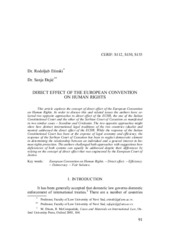Direct effect of the European Convention on Human Rights
Abstract
This article explores the concept of direct effect of the European Convention on Human Rights. In order to discuss this and related issues the authors have selected two opposite approaches to direct effect of the ECHR, the one of the Italian Constitutional Court and the other of the Serbian Court of Cassation as manifested in two similar cases - Scordino and Crnišanin. The two opposite approaches might show how distinct international legal traditions of the two countries (dualist and monist) addressed the direct effect of the ECHR. While the response of the Italian Constitutional Court has been at the expense of legal economy and efficiency, the response of the Serbian Court of Cassation has been to neglect democratic element in determining the relationship between an individual and a general interest in human rights protection. The authors challenged both approaches with suggestions how deficiencies of both systems can equally be addressed despite their differences by relying on the c...oncept of direct effect that was engineered by the European Court of Justice.
Keywords:
Fair balance / European Convention on Human Rights / Efficiency / Direct effect / DemocracySource:
Anali Pravnog fakulteta u Beogradu, 2015, 63, 3, 91-111Institution/Community
Pravni fakultet / Faculty of Law University of BelgradeTY - JOUR AU - Etinski, Rodoljub AU - Đajić, Sanja PY - 2015 UR - https://ralf.ius.bg.ac.rs/handle/123456789/1637 AB - This article explores the concept of direct effect of the European Convention on Human Rights. In order to discuss this and related issues the authors have selected two opposite approaches to direct effect of the ECHR, the one of the Italian Constitutional Court and the other of the Serbian Court of Cassation as manifested in two similar cases - Scordino and Crnišanin. The two opposite approaches might show how distinct international legal traditions of the two countries (dualist and monist) addressed the direct effect of the ECHR. While the response of the Italian Constitutional Court has been at the expense of legal economy and efficiency, the response of the Serbian Court of Cassation has been to neglect democratic element in determining the relationship between an individual and a general interest in human rights protection. The authors challenged both approaches with suggestions how deficiencies of both systems can equally be addressed despite their differences by relying on the concept of direct effect that was engineered by the European Court of Justice. T2 - Anali Pravnog fakulteta u Beogradu T1 - Direct effect of the European Convention on Human Rights EP - 111 IS - 3 SP - 91 VL - 63 DO - 10.5937/AnaliPFB1503091E UR - conv_3241 ER -
@article{
author = "Etinski, Rodoljub and Đajić, Sanja",
year = "2015",
abstract = "This article explores the concept of direct effect of the European Convention on Human Rights. In order to discuss this and related issues the authors have selected two opposite approaches to direct effect of the ECHR, the one of the Italian Constitutional Court and the other of the Serbian Court of Cassation as manifested in two similar cases - Scordino and Crnišanin. The two opposite approaches might show how distinct international legal traditions of the two countries (dualist and monist) addressed the direct effect of the ECHR. While the response of the Italian Constitutional Court has been at the expense of legal economy and efficiency, the response of the Serbian Court of Cassation has been to neglect democratic element in determining the relationship between an individual and a general interest in human rights protection. The authors challenged both approaches with suggestions how deficiencies of both systems can equally be addressed despite their differences by relying on the concept of direct effect that was engineered by the European Court of Justice.",
journal = "Anali Pravnog fakulteta u Beogradu",
title = "Direct effect of the European Convention on Human Rights",
pages = "111-91",
number = "3",
volume = "63",
doi = "10.5937/AnaliPFB1503091E",
url = "conv_3241"
}
Etinski, R.,& Đajić, S.. (2015). Direct effect of the European Convention on Human Rights. in Anali Pravnog fakulteta u Beogradu, 63(3), 91-111. https://doi.org/10.5937/AnaliPFB1503091E conv_3241
Etinski R, Đajić S. Direct effect of the European Convention on Human Rights. in Anali Pravnog fakulteta u Beogradu. 2015;63(3):91-111. doi:10.5937/AnaliPFB1503091E conv_3241 .
Etinski, Rodoljub, Đajić, Sanja, "Direct effect of the European Convention on Human Rights" in Anali Pravnog fakulteta u Beogradu, 63, no. 3 (2015):91-111, https://doi.org/10.5937/AnaliPFB1503091E ., conv_3241 .



